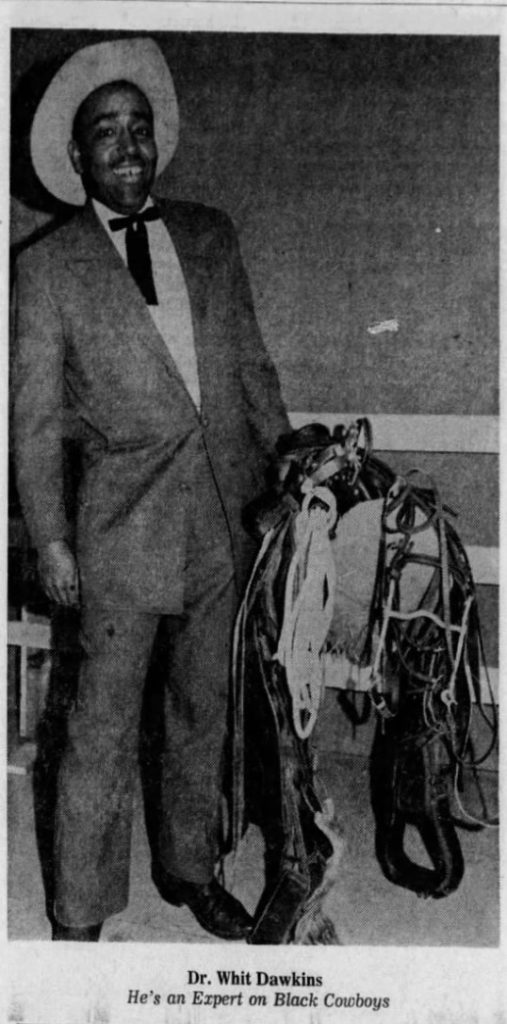Mission Statement
Whit Dawkins Highlights the Role of the Black Cowboy
In late July, 1967 Lyndon Johnson was President of the United States. The Vietnam War was ongoing. The Hippie Movement was at its peak. The fight for the civil rights for African-Americans and all Americans was sparking other rights movements. Pop culture reflected the changes taking place in this country. Light My Fire, by The Doors, and All You Need is Love, by the Beatles were topping the music charts. The Graduate was popular in the movies theatres…
And Dr. Whit Dawkins rode his sorrel horse across the state of Nebraska via highway 20 to highlight the history of the black cowboy.
Dr. Dawkins was a doctor, working for the USDA inspector of animals coming into the area meat packing houses in the Sioux City Metro.
This journey was part of celebrating the Nebraska Centennial. Towns along highway 20 came out to celebrate the historic ride. The Bassett, Nebraska Chamber of Commerce threw a steak dinner for the rider. Ainsworth and O’Neill bestowed honorary citizenship on Dawkins. The Governor and thirty mayors signed a document recognizing the work of the veterinarian.
Black cowboys were a major part, but mostly overlooked group in American history. Many former slaves were attracted to the work of the cowboy. After the reconstruction period they were not allowed to own land, so this was a viable career since they were familiar with working horses and cattle. On the drive itself, the black and white cowboys were treated as equals. But when the cowboys came into town, they often met with the burgeoning Jim Crow laws in the cattle towns.
Black women found work with the cowboys as well, though we do no have statistics, because their pay went to a household instead of to an individual woman. It was not expected that a black woman would inherit a homestead, because white men were not believed to be willing to take orders from a black woman.
Dr. Whit Dawkins was born in Terra Haute, Indiana in 1924. He passed away on April, 12, 1991 and is buried in Dakota City Cemetery.
Written By: Dan Nieman
From South Sioux City to the Harlem Renaissance
Who was Doctor, Tom Stewart? This was the question posed by the biographer, Patrick McGilligan, when he contacted the reference desk of the library.
Patrick McGilligan is a biographer, who focused on members of the entertainment community. At the time, the library had a copy of his biography of Jack Nicholson, Jack’s Life. He was doing research on author and movie director Oscar Micheaux.
Micheaux was an African American, born in Metropolis, Illinois. He moved to Chicago at age 17th. He took many jobs, but concentrated on writing and later turning his books into movies. He moved to western South Dakota, where he worked as a rancher. Eventually, his success brought him to Harlem, during what was called the Harlem Renaissance.
His path took him to Sioux City’s West 7th street, where he set up a book publishing and movie making company. This is where McGilligan crossed paths with the South Sioux City Public Library. McGilligan found that a name that was on Micheaux’s publishing company lived in South Sioux City, Doctor Thomas Stewart.
We were able to find some information on Stewart’s family, enough so he could make a contact and fill in some information about Doctor, Tom Stewart.
Stewart was a large animal veterinarian, who worked with the USDA inspecting cattle in the meat packing plants in Sioux City. It turned out that Stewart was an active supporter of African-American causes, including the work of Micheaux’s publishing company.
This is South Sioux City’s link with the Harlem Renaissance, a large animal veterinarian, who supported the work of the first and greatest African-American movie director of the first half of the 20th century.
By Dan Nieman
Claude M. Bolton Jr., “If I Can Do It, You Can Do It”

The Honorable Claude M. Bolton Jr. grew up in South Sioux City, Nebraska to becoming a Major General in the United States Army. He spent forty years in public service, starting in his enrollment in Air Force ROTC at the University of Nebraska, where he earned his degree in electrical engineering. During the Vietnam War he flew, 232 combat missions. In 1977 he attended the Air Force Test Pilot School. “He was the first program manager for the Advanced Tactical Fighter Technologies Program, which evolved into the F-22 Raptor System Program Office.”(Sioux City Journal, August 17th, 2016).
Following his distinguished military career, Maj. Gen. Bolton was nominated by President George W. Bush to be the Assistant Secretary of the Army for Acquisition, Logistics and Technology (ASA(ALT)) and
served in that position from Jan. 2, 2002, to Jan. 2, 2008. (Sioux City Journal, August 17, 2016). During those years, anything the military wore, ate, or used during those years was purchased by Bolton.
In 2005, he came back to speak with South Sioux City students. “Each and every one of you can do the same thing, I don’t consider myself any different from you all. If I can do it, you can do it.” (Sioux City Journal, Jenny Welp Journal staff writer Apr 1, 2005). If I can do it, you can do it. That’s a big challenge in a very few words.
Download Magazines
Defining Peer Pressure
An Increasingly Important Issue

In May 2014, at an elite prep school in New Hampshire called St. Paul’s School, eighteen-year-old Owen Labrie invited a fifteen-year-old female student to hang out. The meeting was part of a school tradition known as the senior salute, in which graduating seniors asked out younger students. The dates…
Delivery Registration Form
What is NaNoWriMo?
National Novel Writing Month at the South Sioux City Public Library Have you ever wanted to have something in common with successful and talented authors like Marissa Meyers or Scott Westerfield? Do books like Water for Elephants or Fangirl inspire you and make you dream of writing your own book?…
What is Banned Books Week
How to View a Company’s Corporate Structure
Click here

























